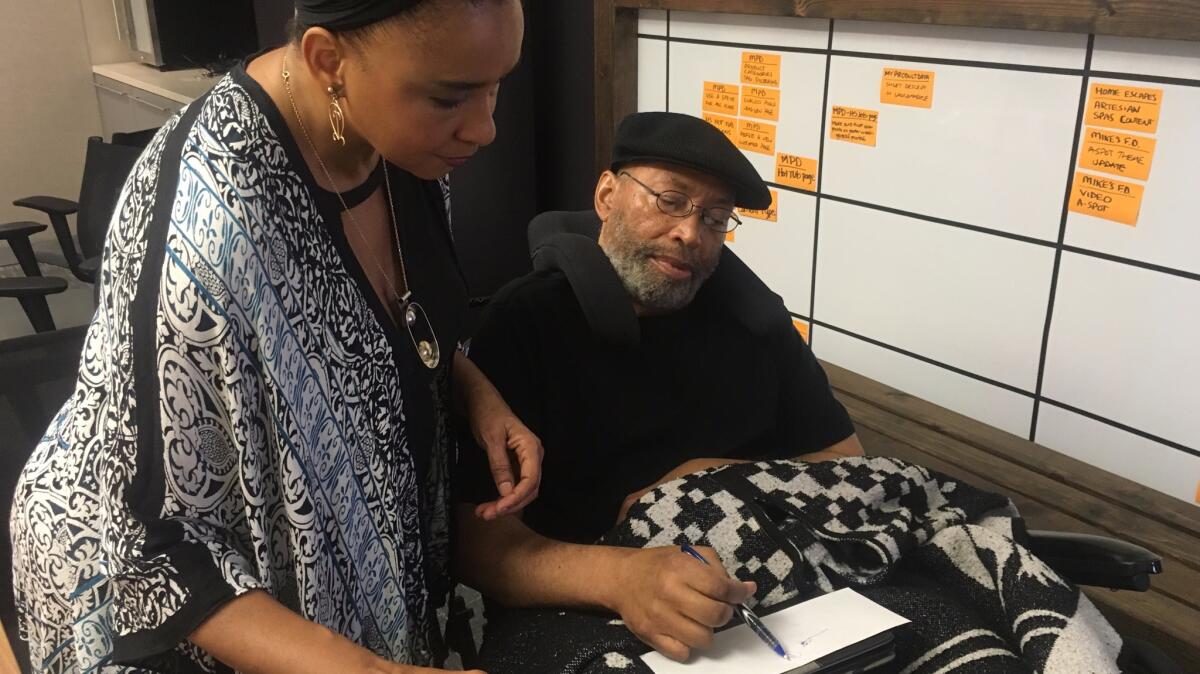San Diego man who lost ability to speak and walk seeks to have voting rights restored

- Share via
Reporting from San Diego — A former producer at NPR who lost his ability to walk and speak asked a judge Tuesday to restore his right to vote under a new California law that makes it easier for people with disabilities to keep that right and regain it if lost.
David Rector, 66, handed a letter to a court clerk shortly after an advocacy group filed a complaint with the U.S. Justice Department asking that California be required to notify people who have been disqualified from voting about the law in time for the Nov. 8 election.
“How are these folks supposed to know about the right to get their voting rights back unless somebody tells them?” Thomas Coleman, legal director of the Spectrum Group, said outside the federal building in downtown San Diego. “The state judiciary has been dragging its feet.”
For years, California judges had stripped away the voting rights of people with some disabilities, including autism, Down syndrome and cerebral palsy, “almost as a matter of routine,” Coleman said.
Mandy Griffith, an assistant U.S. attorney for the Southern District of California, declined to discuss the status of a year-old Justice Department investigation, launched at Coleman’s request, into whether California unlawfully deprives disabled people of voting rights.
Rector was pushed in his wheelchair several blocks to San Diego Superior Court to deliver his written request. Wearing a white T-shirt with black letters that said, “I want to vote,” he looked at a computer with eye-tracking software that voiced his desire to cast a ballot.
A judge will consider the request, court spokeswoman Karen Dalton said.
All but about a dozen states have some type of law limiting voting rights for individuals based on competence. Advocates say how those laws are enforced varies widely — not just by state but by county and judge.
Supporters of the limits say the restrictions protect against voter fraud.
Under California’s new law, which took effect Jan. 1, seniors and other people with disabilities who are assigned conservators to manage their financial and other affairs keep the right to vote unless a court finds “clear and convincing evidence” that they cannot express a desire to exercise it.
“They’re not at the head of the pack, but they’re definitely on the forefront,” said Michelle Bishop, voting rights specialist at the National Disability Rights Network. “This idea that you simply have to express the desire to vote is how we want people to be thinking about voting rights.”
Coleman anticipates the law will provide voting protections in conservatorship cases going forward. The challenge, he said, is getting the word out to people who have lost the right — a number he estimates at 32,000 in California based on a review of Los Angeles County records.
California Secretary of State Alex Padilla said in a statement that his office had not seen the complaint and could not comment specifically on it. But Padilla said he supported the bill that became the law.
“We continually explore ways to provide information to California’s diverse population and are always open to receiving recommendations to improve our outreach efforts,” Padilla said.
The Judicial Council of California, which sets policies for state courts, had no immediate comment Tuesday.
Rector moved to San Diego from Washington, D.C., in July 2008 to join his fiancee, Rosalind Alexander-Kasparik. He registered to vote almost immediately, even before getting a new driver’s license.
Eight months later, Rector clutched his chest and fell to his knees while reading a newspaper at breakfast, stricken by a tear in his aorta. After two days in the hospital, he suffered severe brain trauma that left him unable to speak or use his arms and legs.
Today, he uses a wheelchair to move around and can write with limited use of his right thumb. He communicates with electronic devices, using his thumb or eye-tracking software to indicate what he wants. According to the complaint, he can think, feel, comprehend, remember, see, hear and express emotions. During an interview, he cried out when Alexander-Kasparik described his injury and extended his hand to say goodbye.
Alexander-Kasparik says her fiance is still a voracious consumer of TV and radio news and that they collaborate on a comic book series. He laughs when watching scenes from “Star Wars.”
Rector voted in 2010, telling his fiancee of his opinions on a flurry of state ballot measures. At a hearing the following year to appoint Alexander-Kasparik his conservator, Rector cried out after a judge checked a box that said he could no longer vote.
“We knew it was coming, but we didn’t know there was anything that could be done about it,” said Alexander-Kasparik, describing it as a devastating blow.
As this year’s election neared, Alexander-Kasparik asked friends on social media for help getting Rector’s rights restored. She eventually learned about the law authored by state Sen. Marty Block, a San Diego Democrat.
Voting “is central to his life,” Alexander-Kasparik said. “Civic responsibility is central to his life ... There are so many people who died for this right. So many people take it for granted.”
ALSO
Can Donald Trump really round up and deport 11 million people?
Voting will never be quite the same in California if expansion of mail-in ballot becomes law
All the California bills about police body cameras have failed this year
More to Read
Sign up for Essential California
The most important California stories and recommendations in your inbox every morning.
You may occasionally receive promotional content from the Los Angeles Times.










